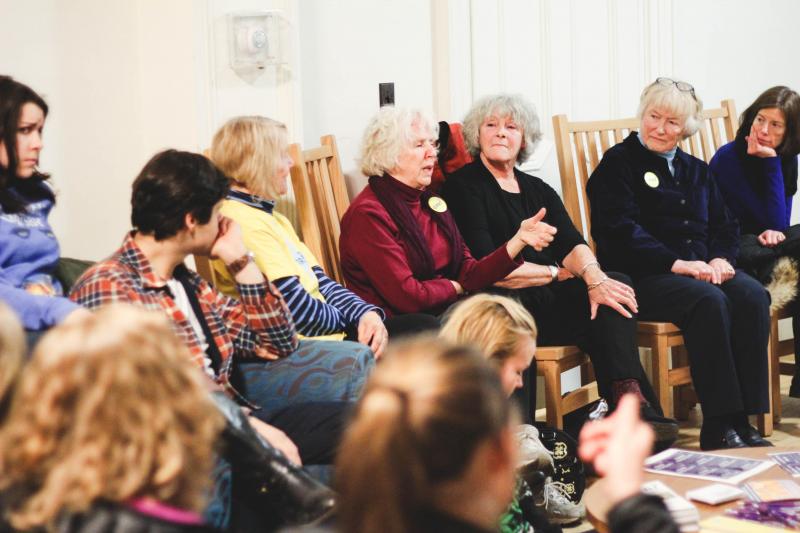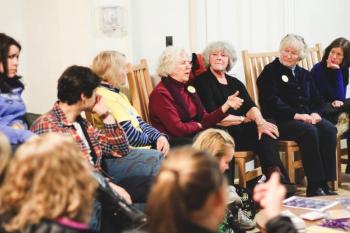Intergenerational women discuss reproductive health care and how times have changed
A group of Midcoast women in their 60s, 70s and 80s from the group Grandmothers for Reproductive Rights (GRR) met Feb. 23 with some 30 student members of the Bowdoin College NARAL pro-choice group, to learn from each other how times have changed in reproductive health care since the days when the grandmothers were in their teens.
Many of the young Bowdoin women, from across the United States, seemed to take for granted the reproductive freedom they have, and to perhaps not realize what women suffered before 1973 when the U.S. Supreme Court’s Roe v Wade decision made abortion legal.
The meeting, in Burnett House, a student residence on Maine Street in Brunswick, opened with a short film in which one of the grandmothers in attendance told her story of how as a young unmarried pregnant woman she was sent away by her parents to hide her pregnancy – a common practice in those days, she said. “The girls that went away,” she called them.
She described in the film and in the subsequent discussion that she was sent to the Florence Crittenton Home near Boston. When the time came for her to give birth, she was sent alone in a taxi during a snowstorm to a nearby hospital where she delivered a baby girl on a very busy night there.
“I did get to see and hold, love, feed and care for my daughter while I was in the hospital,” she explained, “but the day I left, I went one way and she went another” -- the baby to a foster home and subsequent adoption and she to her own home where her parents never once mentioned what had happened to her. Life just went on as before, she said, with neighbors, friends and classmates told she had been visiting a distant relative.
Being shunned in this way, she said, deeply affected her throughout her life, and only through therapy later in life was she able to come to terms with it. And, because of the therapy and her trust in the GRR women, she finally had the emotional strength to get in touch with the Florence Crittenton Home to let them know that if that baby girl, now an adult, wants to find her birthmother, she would like that. “If my daughter wants to find me,” she said, “it will be easy” for her to do so.
Other grandmothers at the meeting told heart rending stories of their young adulthood when obtaining birth control was difficult, and abortion illegal. One grandmother, a physician, told of how as a young intern she cared for a ward filled with women who had sepsis, blood infection, due to botched illegal abortions. Many of these women died, she said, and the ward was continually filled.
The grandmothers said they fear that the reproductive rights they fought so hard for so long ago might now be in jeopardy because many state legislatures are enacting laws to make it more difficult for women to have access to reproductive care or to an abortion.
Some of the Bowdoin women mentioned that they were aware of the situation and were active in taking on this fight. One of them said she was questioning whether Crisis Pregnancy Centers set up by abortion opponents in many states are giving accurate information to women who are seeking ways to deal with a crisis situation. She said she feared that these clinics provide questionable information to their clients, saying, for example, that abortion leads to breast cancer, or that the procedure has to be done in a hospital setting.
The GRR physician at the meeting said neither is true. In fact, she said, an abortion in the first trimester is much safer than giving birth, and the “simple procedure” does not need to be done in a hospital. “We must destigmatize the word abortion,” she said.
Both the grandmothers and the young college women acknowledged that reproductive health care has enabled women to have productive careers, to put off marrying and having babies until they are emotionally and financially ready. To take this away, the old and young agreed, would be a step in the wrong direction.
“I love old ladies,” one of the Bowdoin students wrote after the event. “Amazing, powerful stories….We need to keep up vigilance or else we will go back to shaming and silence.”
Event Date
Address
United States
























